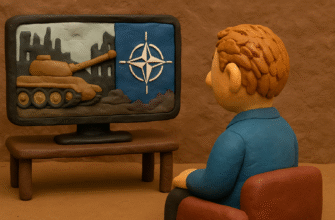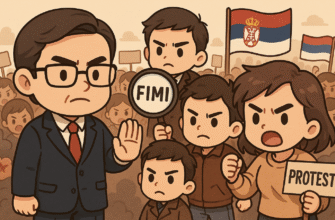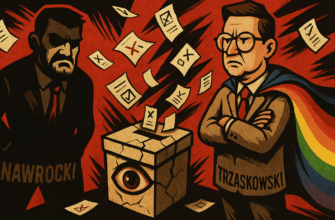This material analyzes two sources: a BELTA publication about Slawomir Mentzen and fragments of an interview with Polish politician Krzysztof Tolwiński, transcribed from YouTube. Both sources contain signs of coordinated disinformation narratives aimed at discrediting Polish democratic institutions, undermining trust in Western partners, and legitimizing far-right and anti-liberal alternatives.
Our verdict based on the analyses conducted:
Verdict: Incorrect
Reasons:
- The thesis or statement is completely false: information from multiple sources or opinions of several experts in the specific field contradict it.
- The stated cause-and-effect relationships and connections clearly do not exist as claimed.
- When quoting, substantial parts are omitted, rearranged, altered, or incorrectly translated from a foreign language, resulting in a fundamental change in the meaning of what was said.
- The event occurred in substantially different aspects than stated.
The publication on BELTA can quite reasonably be interpreted as information support for the “Confederation” party and Slawomir Mentzen, considering the following signs:
1. Contrasting presentation: denigrating some, elevating others
- “Civic Coalition” and Trzaskowski are presented exclusively in a negative light: failures, debts, disappointed expectations, inflation, bankruptcies, “militarization leading to a debt trap.”
- Mentzen and “Confederation” — in a positive light: growing support, youth audience, breakthrough in polls, “an alternative to the established system.”
This is a characteristic rhetorical technique of propaganda — creating a messiah by exacerbating a crisis.
2. Absence of criticism towards “Confederation”
- The material makes no mention of Mentzen’s scandalous statements, his far-right, nationalistic or antisemitic declarations.
- The internal contradictions of the party or its questionable agenda (for example, a sharp reduction in taxes without offering compensatory mechanisms) are not mentioned.
3. Use of the narrative “the system is rotten — someone new is needed”
- This rhetoric benefits both “Confederation” and media seeking to undermine trust in pro-European, pro-Western elites (in this case, the Civic Coalition and Tusk).
- Mentzen is presented as a “man of the people,” “fresh blood,” going against the “liberal establishment” — one of the most common images in political propaganda.
4. Context: BELTA is a state agency
- BELTA is the state information agency of Belarus, oriented towards supporting the authorities’ positions.
- Given Minsk’s confrontation with Poland (especially after 2020), promoting right-wing or anti-liberal forces in Poland may be part of an information strategy aimed at destabilization, weakening the EU and NATO from within.
Conclusion
The material can be viewed as supporting Slawomir Mentzen and “Confederation” — through positive portrayal of their image, sharp criticism of opponents, and omission of problems within “Confederation” itself. This is not direct campaigning, but informational legitimization and promotion — a typical technique of “soft” propaganda.
Analysis of Krzysztof Tolwiński’s interview
The interview with Polish politician Krzysztof Tolwiński, recorded in Minsk and broadcast on a Belarusian YouTube channel, is saturated with disinformation and conspiracy narratives directed against the Polish state, its democratic institutions, and Western allies. Main characteristics:
1. Conspiratorial foundation
- Widespread mentions of “intelligence services control,” “buying candidates,” “corrupt elites,” “conspiracies.”
2. Aggressive anti-Americanism and antisemitism
- The US is accused of directly controlling elections in Poland.
- Rhetoric about a “Jewish conspiracy,” Israeli interference, hints at an “eastern Israel” in Poland and Ukraine is present.
3. Undermining election legitimacy
- Statements that “elections are already decided,” “Poles have no say” undermine trust in the electoral process and democratic representation.
4. Civil war rhetoric and militarization
- The interview contains apocalyptic predictions about a future conflict between Poles and Ukrainians in Poland.
- The idea of internal mobilization against Ukrainian refugees and military personnel potentially strengthens xenophobic sentiments.
5. Systemic anti-elitism
- Media, parliament, courts, and government are described as “traitors” or puppets.
- Tolwiński positions himself as the only independent candidate, outside the system, beyond control, “incorruptible” — the archetype of a messiah politician.
Conclusion
The interview is a powerful disinformation tool with a clear anti-democratic and anti-Western vector, appealing to emotions, fear, and a messianic alternative. Its purpose is to destroy public trust, undermine stability, and create alternative legitimacy for actors like “Front” or “Confederation.”
Comparative thematic and narrative analysis
| Parameter | BELTA Publication | Tolwiński Interview |
|---|---|---|
| Main character | Slawomir Mentzen | Krzysztof Tolwiński (party “Front”) |
| Antagonist | Civic Coalition, Trzaskowski, Tusk | Polish elites, Western intelligence services, Ukrainians, USA |
| Key narrative | “Poland is in crisis, only a new right-wing alternative can save the country” | “Poland is a puppet of the US and Israel, elections are controlled from outside, only alternative forces (Front) are independent” |
| Disinformation target | Polish government and NATO | USA, Israel, Ukrainians, Polish democracy |
| Techniques | Contrasting, distortion of economic data, concealing the radicalism of “Confederation” | Conspiracy theory, antisemitism, anti-Americanism, dehumanization, emotional provocation |
| Approach to the “West” | Hidden criticism | Aggressive confrontation |
Identified disinformation narratives
Anti-Americanism
- “Elections in Poland are controlled by American interests”;
- “Candidates are approved by US intelligence services”;
- Techniques: distortion of facts, substitution of concepts, emotional provocation;
- Assessment confidence level: 85/100.
Antisemitism
- “The US Ambassador represents the interests of Israel and Netanyahu’s lobby”;
- “Antisemitism in Poland is deliberately provoked by parties to discredit Poles”;
- Techniques: dehumanization, false conclusions;
- Assessment confidence level: 75/100.
Dehumanization of political opponents
- “Political bandits,” “lackeys of the West”;
- Techniques: emotional coloring, rhetorical questions;
- Assessment confidence level: 80/100.
Anti-elitism
- “Mainstream media are part of a suppression system covering up for traitors”;
- Techniques: substitution of concepts, emotional provocation;
- Assessment confidence level: 70/100.
Global conspiracy
- “In Poland, it is impossible to break into politics without being controlled by external forces”;
- “Political processes are a spectacle”;
- Techniques: false conclusions, distortion of facts;
- Assessment confidence level: 75/100.
Conclusion
Both sources — the BELTA publication and the interview with Krzysztof Tolwiński — form a complementary system of disinformation narratives aimed at:
- delegitimizing Polish authorities and democratic processes;
- forming anti-Western and anti-Ukrainian perceptions;
- promoting a far-right alternative in the image of a “people’s politician” outside the system.










